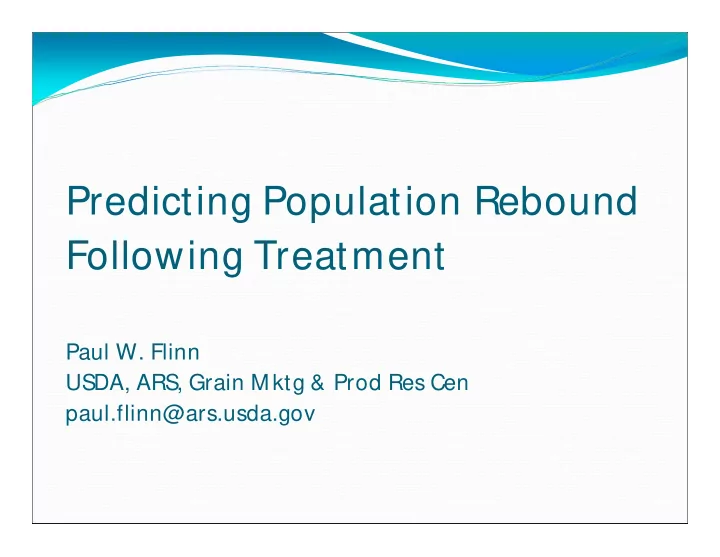

Predicting Population Rebound Following Treatment Paul W. Flinn USDA, ARS, Grain M ktg & Prod Res Cen paul.flinn@ars.usda.gov
Introduction M odels have been developed for several species of insects for stored grain These models have been validated and proven to be useful for predicting insect infestations in stored grain They have also been useful for developing strategies for the timing and optimal use of treatments for insect prevention and control It would be useful to develop a similar model for flour mills that could be used to predict infestations and to develop strategies for prevention and optimal timing of control methods
50 10,000 bu Bin 45 3,000 bu Bin 40 35 30 25 20 15 10 5 0 1-Jun 1-Aug 1-Oct 1-Dec 1-Feb 1-Apr 1-Jun
120 No Aeration 100 Manual Aeration Auto Aeration Harvest 80 60 40 20 0 1-Jun 1-Aug 1-Oct 1-Dec 1-Feb 1-Apr 1-Jun
• To develop a computer model of the red flour beetle for flour mills • The model will be able to predict population growth for all life stages of the red flour beetle • The model will include M ethyl Bromide, Sulfuryl Fluoride fumigation, and heat treatment • Sanitation (refugia) in the mill, immigration from outside, and insect movement within the mill will also be included • Result: a tool that can be used to investigate optimal preventative and treatment strategies for the red flour beetle in flour mills
M odel for the Red Flour Beetle in a Flour M ill Input: Output: Insect Temperature Predicted Insects in Mill Fragments Humidity Insect Fragments in Flour? in Flour Sanitation Level Effects of Sanitation and Insecticides Treatments Temperature Insects Outside Insects Inside Insects Inside Building Mill Mill Equipment Fumigation or Weather Sanitation Heat Treatment
Status of the Red Flour Beetle Model • We have developed a computer model of the red flour beetle for flour mills based on a previous model for stored grain • The model uses hourly temperature data for each of five floors to predict insect numbers for each floor (all stages) • Model will include methyl bromide, sulfuryl Fluoride fumigation, and heat treatment • Includes: sanitation (refugia) in the mill and immigration from outside
Summary A lot of work still needs to be done on the model In the next few months we will be adding sulfuryl fluoride and heat treatment to the model We need to validate the model using field studies We need to add movement of adults between floors and seasonal immigration into the building A lot of potential: reducing the number of treatments/ yr, finding the best date to fumigate, importance of sanitation, etc.
Recommend
More recommend